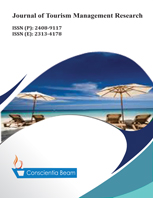Edu-Tourism Destination Selection Process in an Emerging Economy
DOI:
https://doi.org/10.18488/journal.31.2019.61.45.59Abstract
International Edu-tourists seeking university education outside of their countries of origin was 4.1 million in 2010 and the figure is forecasted to hit 7.2 million by the year 2020, thus creating a market value worth US$342billion. Exporting university education services contributed US$6.6billion to Malaysia’s Gross National Income (GNI) in 2009. Malaysia plans to earn US$14.67 billion yearly from 2020, including, creating 536,000 jobs. This highlights the importance of international Edu-tourists for Malaysian Edu-tourism industry promotion. Explaining the stages international Edu-tourists go through to select Malaysia as their preferred Edu-tourism destination, including validating factors that contribute to this tourist travel decision form the basis of this study. The study is based on the push-pull theory and 500 international Edu-tourists in 13 Malaysian universities were sampled. Results of confirmatory factor analysis revealed that Edu-tourists’ socio-cultural factors, the quest for career development, and economy status of their country of origin all contributed to Edu-tourists’ decision to study abroad. The socio-cultural and economic factors of Malaysia attract Edu-tourists to Malaysia, while the institutional and internationalisation attributes of Malaysian universities encourage them to choose these universities. It is suggested that tourism operators in Malaysia make the most of the attractive socio-economic environment in Malaysia for the effective positioning strategy of Malaysia in the global Edu-tourism market. Edu-tourism destination marketing strategies should be designed for Malaysia, using her socio-economic attributes. The reputation of Malaysian universities as essential Edu-tourism assets should be promoted to develop the Malaysian tourism industry. Tourism destinations in Malaysia should encourage social interaction between Edu-tourists and host destinations.

